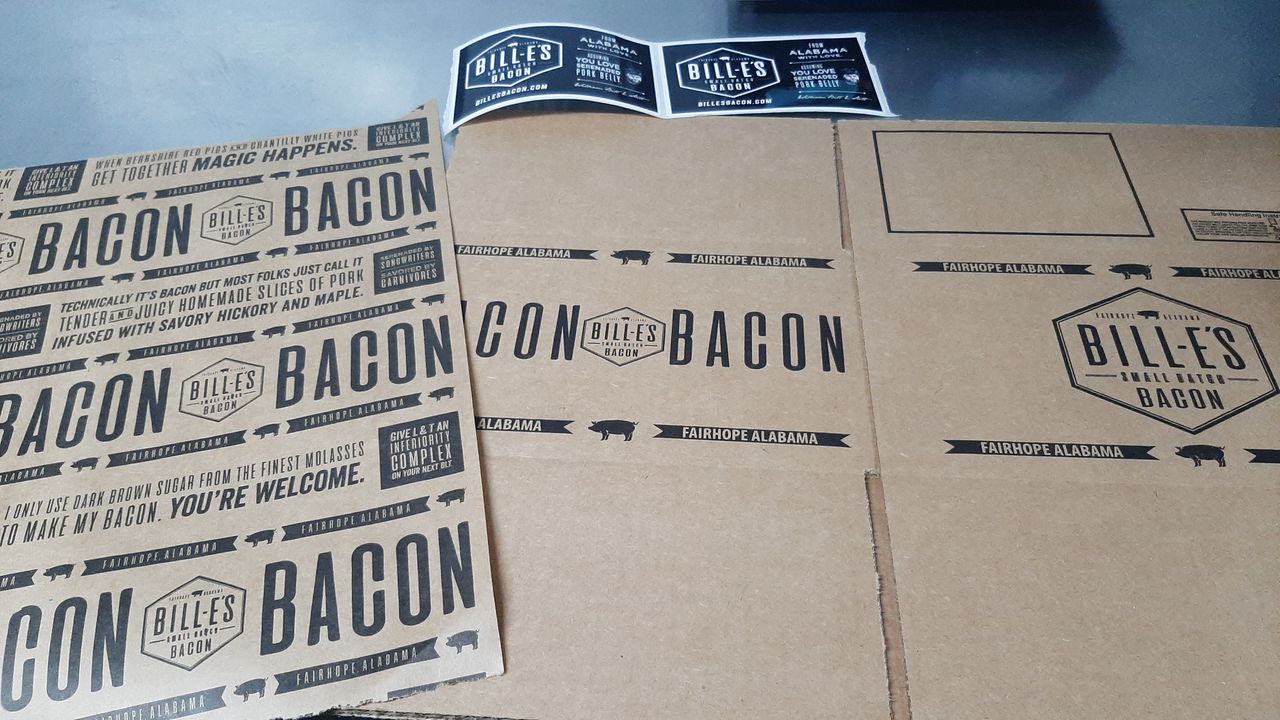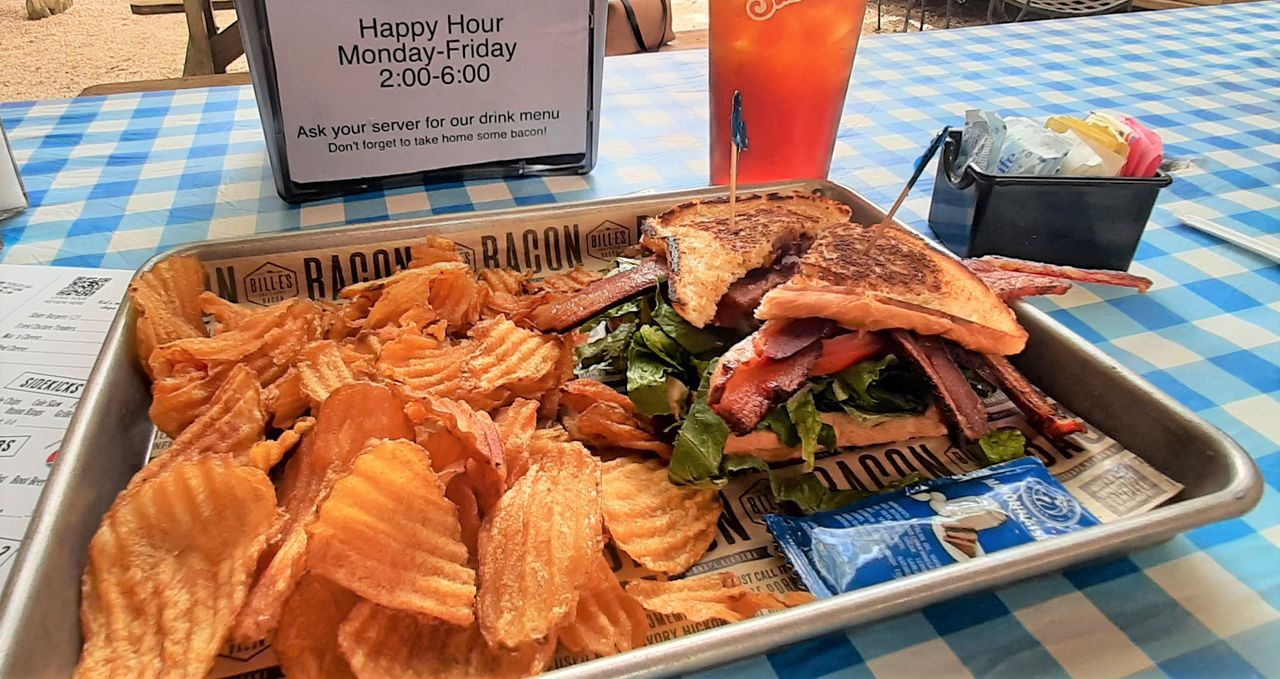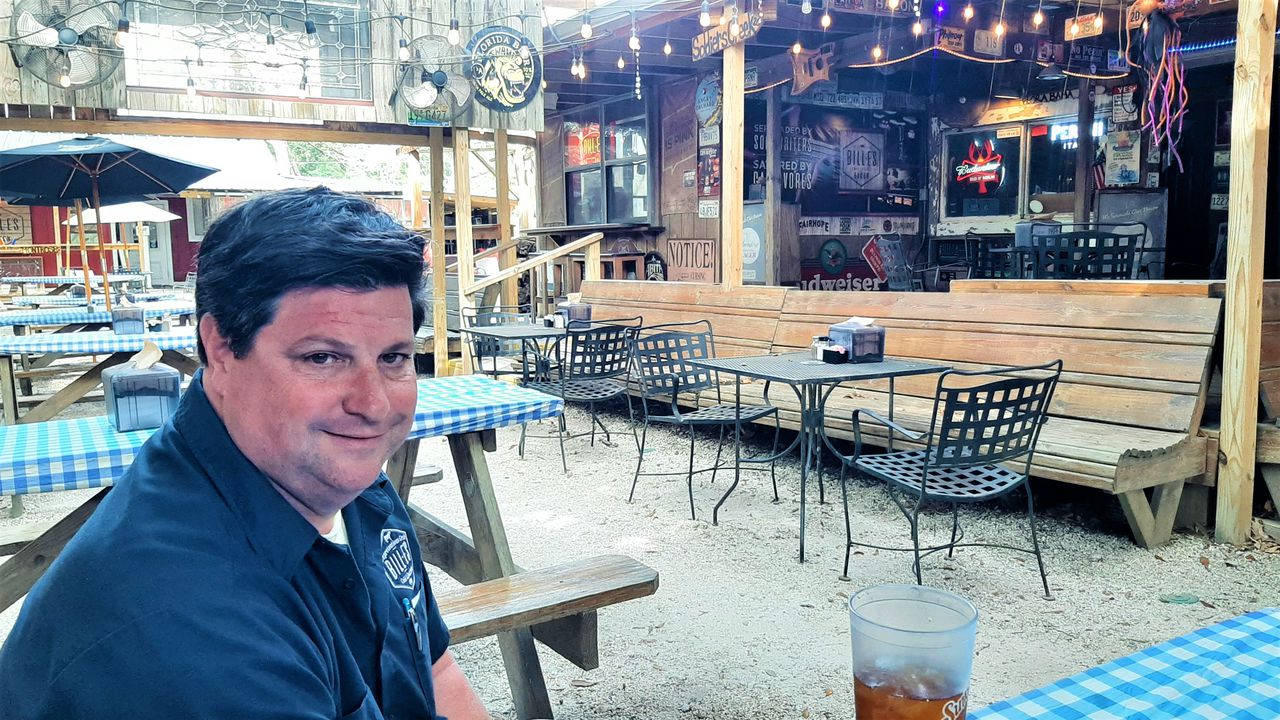Bacon is Bill E’s business, and business is good
From the outside there’s a tendency to think: If you get the bacon right, the business will just take care of itself.
Bill E. Stitt has been making killer bacon in Fairhope for years. Bacon that TasteofHome.com picked as the best bacon in Alabama. Bacon that food writer Scott Gold, “America’s Bacon Critic,” once ranked as one of the four best bacons in the nation. Bacon that chefs all over the central Gulf Coast use to add an explosive top note of flavor to already-rich dishes. Bacon that ships nationwide.
But it wasn’t the bacon that recently earned top honors from the Alabama Retail Association, even if the judges loved it. It was Stitt’s hard work on the business side.
It helps to know where Stitt is coming from. On bacon itself, his understanding is practically primeval. “I learned how to make it when I was a teenager,” he said. “A guy in Mississippi taught me how to butcher, and then he taught me how to cure meat. Then before I went off to college, he said, ‘I want to teach you to make bacon the way our ancestors did.’ And that’s what I’ve been doing.”
After college, Stitt spent 20 years with the Ruby Tuesday chain. The day came when he decided he’d rather stay in Lower Alabama and do his own thing than move to stick with that company as ownership and leadership changed. In 2011 he opened the Old 27 Grill in Fairhope. Now he had an outlet to put his meat-curing knowledge to work. He started curing his own supply of bacon for the restaurant, smoking it in a room right behind the small courtyard stage. He had a great gimmick: He called it “serenaded bacon,” saying it soaked up some of the good vibrations from the songwriters performing on that stage.
Somewhere around seven years ago, he ramped up production, making “Bill E’s Small Batch Bacon” available to other restaurants and private customers. Demand grew rapidly, and the acclaim from connoisseurs such as Gold soon followed.
Bill E. Stitt said that no matter how much his bacon business grows, he wants his Fairhope restaurant to feel like “a sleepy little burger joint that makes its own bacon.”Lawrence Specker | [email protected]
However, the challenge of self-distributing the product, while still running the restaurant, was running Stitt ragged. “Three years ago I was not in a good place,” he admitted. “I really was afraid it would be the end of me.”
Visited recently, Stitt talked about the adaptations that have strengthened his businesses and set the stage for future growth, without requiring him to run himself into the ground.
Maybe the biggest one is distribution. Three distributors – U.S. Foods, Ben E. Keith and Louisiana-based Perrone & Sons – now make Bill E’s bacon available to markets and restaurants across Alabama, Mississippi, Louisiana and parts of Florida. Stitt said you can find it in some Piggly Wiggly, Rouses Markets and Winn-Dixie stores.
Direct online sales are now handled by Goldbelly.com, and Stitt said that partnership has made a night-and-day difference.
“GoldBelly helps me by managing all the emails and phone calls. We just print the labels off in the morning and fulfill the orders. That’s been a dream,” he said. “They don’t make anything and they don’t warehouse anything, but they’re where foodies go to get interesting ingredients.”
The bottom line, he said, is that “We were able to scale up without adding a bunch of people.”
Scaling up: In a 2015 AL.com interview, Stitt said he was producing about 500 pounds of bacon a week. Now it’s 3,000 to 3,500 pounds a week, maybe more in the ramp-up to the Christmas gift season. He’s got a USDA inspector on-site five days a week. The stuff is going everywhere. “We’ve got a place in Rodeo Drive that orders it every month,” Stitt said. “St. Louis and Cincinnati and several places in Manhattan…Trendy little stores that get it, they’ll order 24 pounds. They constantly reorder.”
The Alabama Retail Association honored Stitt as Silver Retailer of the Year for operations doing $1 million to $5 million in annual business. Stitt said that both his restaurant and the bacon business independently rank in that bracket.
And yet, the bacon production facility is remarkably compact, even after multiple rounds of expansion. It’s all on the grounds of the sprawling restaurant, if you know where to look.
It starts and ends with two walk-in coolers. In one of them, tubs of bacon go through the eight-day curing process. The tubs hang in rolling racks, a fairly recent addition that did away with a lot of hand-carrying.
“We just got these trolleys a month or two ago,” said Stitt. “I own bacon trolleys, man! How many people can say that?”
The pork bellies come in fresh from a network of farms, mostly in the Midwest, that has grown along with production. Premium pork is a global commodity. It takes relationships to secure a steady supply.
“I started with three small farms. I now have 24 that grow for me,” said Stitt. “They’re my friends. They’re, some of them, fourth-generation.”
They like knowing their premium pork is getting to domestic craftsmen, he said: “That’s why the farmers like me. I’m an avenue for them to sell high-end product and we can both do well.”
After eight days of curing, slabs go into one of five electric smokers, which Stitt uses because he puts a premium on reliability and consistency. They’re packed into the room behind the “bacon stage.” They’re named for “five of my childhood friends and college roommates,” he said. “I tell my other friends, ‘If you stick with me, you might get a smoker named after you.’”
Half a day of smoking and they go into three chillers, where they’re cooled and held for slicing and packaging. Stitt said meat comes out of the smoker at around 10:30 a.m. most weekdays and he’s happy for people to come stand at the window and watch before having lunch, “like watching the doughnuts get made at a Krispy Kreme.”
Packaging includes wrapping paper and boxes that bear the Bill E’s logo, and that’s another piece of the process that illustrates the extent to which Stitt does not take any of this for granted.
“My father was in the packaging business his whole life,” said Stitt. “That’s been very emotional for me because my dad sold empty bags and boxes his whole life. When I went from a stock, generic box to my own branded box, it was a big, big day for us.”

Custom packaging is no small thing for Bill Stitt.Lawrence Specker | [email protected]
After it’s wrapped and boxed, the bacon goes into the other walk-in, ready to ship.
Stitt has never been one to downplay his Ruby Tuesday experience, and he said it helped him understand that he needed to step back sometimes, analyze what wasn’t working and make changes. He needed to delegate.
“It gave me a lot of that,” he said. “It gave me a whole lot of ‘don’t quit.’ I’ve never been a quitter, but it gave me the drive. You know, to do this you’ve got to let people do their job. That doesn’t mean you sacrifice quality, but sometimes you’ve got to go through some growing pains to get them to where they understand the brand. You can’t do it all. You feel miserable.”
That came in handy during the COVID-19 pandemic. When the shutdowns hit, the bacon business exploded. The restaurant almost imploded.
“Fairhope was so good to me,” Stitt said. “Now, just like everybody else, a whole bunch of employees just kind of fell off the face of the earth and disappeared. But we had some that said ‘Billy, I want to work. What can I do?’…That handful of folks that stuck around kept us alive. And then we kind of found a few people.”
The restaurant is on Baldwin 181 on the southeast side of Fairhope, just south of a Walmart, just past the edge of the sprawl eating away at the pastoral Baldwin of old. Its dirt and gravel parking lot is shaded by oaks. It’s a ramshackle roadhouse, with rustic indoor-outdoor seating. It used to be known as Old 27 Grill but now it’s Bill E’s, because consolidated branding just made sense.
“People didn’t really know what 27 meant. We were trying 27 beers, 27 burgers, 27 wines. The road became Highway 181, The 27 thing just kind of got weirder and weirder,” said Stitt. “I would have these people come in from all over the country, they were like, ‘Hey, man, we’re here to get your bacon. I didn’t even know you had a restaurant.’”

As you’d expect, the BLT at Bill E’s restaurant in Fairhope features plenty of the bacon Bill Stitt makes on-site.Lawrence Specker | [email protected]
Is bacon on the menu? Lord, yes. There’s a fine BLT and a Pork Belly Sandwich that a restaurant industry news site picked as one of the best sandwiches in America in 2018. You can get it in appetizers, such as the Pork Belly Bites Trio. You can get it on a salad or add it to a burger.
Stitt, sitting in the restaurant courtyard talking, was clearly at ease and at home. A small group came in after the lunch rush, wearing University of Kentucky blue, and he jumped up to greet them.
“Y’all played a good game Saturday,” he said. “I’m an Ole Miss Rebel, don’t hold it against me. I was up there and I thought y’all’s team did really well.”
“Didn’t do well enough!” responded one of the visitors, cheerfully.
Stitt can see bigger things for the restaurant. In its offices there’s a conference room that can seat 20 to 30 people. He’d like to market it as a corporate retreat site. Factor in the outdoor space, and it could hold bigger groups. It could be a bacon-themed destination.
The same is true for the bacon business. Stitt would like to have a production facility big enough to handle more of the pig. Shoulders, butts, hams. Maybe even other meats. With bacon alone, he’s established that the market is there.
“From a search perspective, if you Google bacon, you’re going to find me,” Stitt said. “There’s no way not to. And I don’t know how that happened, but it happened.”
The potential is, shall we say, mouth-watering. “Most people will buy a butt and season it up and throw it in the smoker,” he said. “I would cure mine, like I do the bacon. It’s amazing when it’s done right.”
The whole trick is growing the enterprise without losing any of the flavor.
“I just want people to come here and feel like the place has been here forever,” he said. “I just want it to be a sleepy little burger joint that makes its own bacon.”
